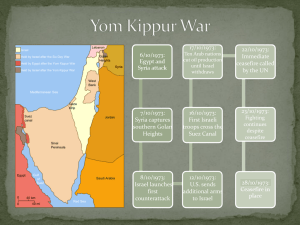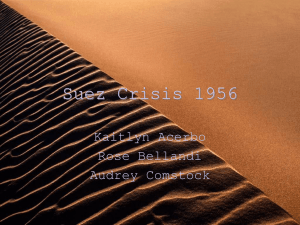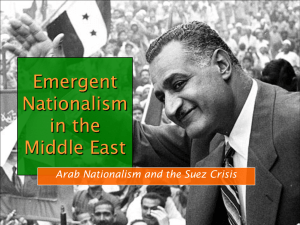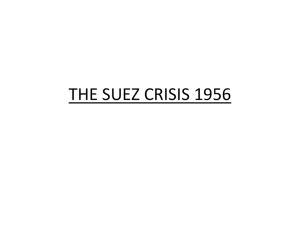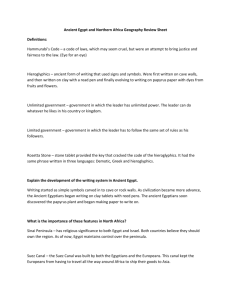9/16 Suez Crisis SuezLetters
advertisement
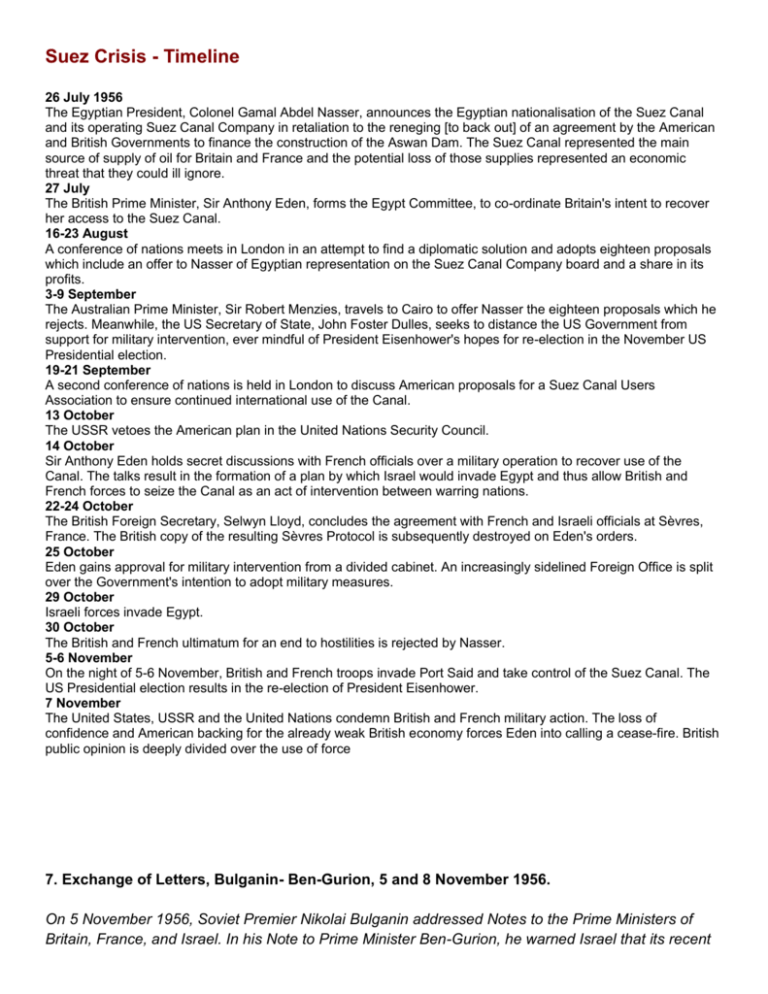
Suez Crisis - Timeline 26 July 1956 The Egyptian President, Colonel Gamal Abdel Nasser, announces the Egyptian nationalisation of the Suez Canal and its operating Suez Canal Company in retaliation to the reneging [to back out] of an agreement by the American and British Governments to finance the construction of the Aswan Dam. The Suez Canal represented the main source of supply of oil for Britain and France and the potential loss of those supplies represented an economic threat that they could ill ignore. 27 July The British Prime Minister, Sir Anthony Eden, forms the Egypt Committee, to co-ordinate Britain's intent to recover her access to the Suez Canal. 16-23 August A conference of nations meets in London in an attempt to find a diplomatic solution and adopts eighteen proposals which include an offer to Nasser of Egyptian representation on the Suez Canal Company board and a share in its profits. 3-9 September The Australian Prime Minister, Sir Robert Menzies, travels to Cairo to offer Nasser the eighteen proposals which he rejects. Meanwhile, the US Secretary of State, John Foster Dulles, seeks to distance the US Government from support for military intervention, ever mindful of President Eisenhower's hopes for re-election in the November US Presidential election. 19-21 September A second conference of nations is held in London to discuss American proposals for a Suez Canal Users Association to ensure continued international use of the Canal. 13 October The USSR vetoes the American plan in the United Nations Security Council. 14 October Sir Anthony Eden holds secret discussions with French officials over a military operation to recover use of the Canal. The talks result in the formation of a plan by which Israel would invade Egypt and thus allow British and French forces to seize the Canal as an act of intervention between warring nations. 22-24 October The British Foreign Secretary, Selwyn Lloyd, concludes the agreement with French and Israeli officials at Sèvres, France. The British copy of the resulting Sèvres Protocol is subsequently destroyed on Eden's orders. 25 October Eden gains approval for military intervention from a divided cabinet. An increasingly sidelined Foreign Office is split over the Government's intention to adopt military measures. 29 October Israeli forces invade Egypt. 30 October The British and French ultimatum for an end to hostilities is rejected by Nasser. 5-6 November On the night of 5-6 November, British and French troops invade Port Said and take control of the Suez Canal. The US Presidential election results in the re-election of President Eisenhower. 7 November The United States, USSR and the United Nations condemn British and French military action. The loss of confidence and American backing for the already weak British economy forces Eden into calling a cease-fire. British public opinion is deeply divided over the use of force 7. Exchange of Letters, Bulganin- Ben-Gurion, 5 and 8 November 1956. On 5 November 1956, Soviet Premier Nikolai Bulganin addressed Notes to the Prime Ministers of Britain, France, and Israel. In his Note to Prime Minister Ben-Gurion, he warned Israel that its recent actions had placed its very existence in jeopardy. The Soviet Union recalled its ambassador from Israel. On 8 November, Prime Minister Ben-Gurion replied to Premier Bulganin and ended by expressing his surprise and sorrow at "the threat against Israel's existence". Document A: Mr. Bulganin to Mr. Ben-Gurion: Mr. Premier: The Soviet Government has already expressed its definite condemnation of the armed aggression by Israel as well as by Britain and France against Egypt which was a direct and open violation of the Charter and principles of the United Nations... All peace-loving mankind indignantly brands the criminal actions of the aggressors who have attacked the Egyptian State. Disregarding this, the Government of Israel, acting as a tool of foreign imperialist Powers, continues the foolish adventure... Such actions by the Government of Israel plainly show what all the false assurances of Israel's love of peace and its desire to co-exist peacefully with the neighbouring Arab States were worth. By these assurances the Government of Israel was in fact striving merely to lull the vigilance of other nations, preparing a treacherous attack against its neighbours... Being vitally interested in the preservation of peace and in safeguarding calm in the Middle and Near East, the Soviet Government is at this moment taking measures with the aim of stopping the war and curbing the aggressors. We appeal [to] you, the Parliament, the working people of the State of Israel, to the entire people of Israel: stop aggression, halt the bloodshed, withdraw your troops from Egyptian territory. Bulganin Document B: Mr. Ben-Gurion to Mr. Bulganin: Mr. President of the Council of Ministers: I have received your note of 5 November 1956. I have read it carefully and I am sorry that I must point out that some arguments are based on incomplete and incorrect information you received. More than two years ago Egypt's ruler organized a special force whose purpose is to penetrate secretly within the boundaries of our country and to murder citizens working in the fields, travelling along the roads, and dwelling in their homes. In an Order dated 25 February 1956, by the Commander of the Egyptian Division in Sinai, it is said: "Every commander is to prepare himself and his subordinates for the inevitable campaign with Israel, for the purpose of fulfilling our exalted aim, namely, the annihilation of Israel and its extermination in the shortest possible time, in most brutal and cruel battles." Egypt's ruler organized, an economic boycott against Israel. He established a blockade against our freedom of navigation in the Suez Canal and the Straits of Eilat, and for five years he had violated a decision of the Security Council concerning the freedom of passage of Israel's ships in the Suez Canal. About two weeks ago the Egyptian ruler concluded a military pact with Jordan and Syria against Israel. Therefore, the action we carried out at the end of October was necessary and was not dictated by foreign wishes as you have been told. In response to the appeal of the General Assembly of the United Nations we ceased fire and for several days past there has been no armed conflict between us and Egypt. Yesterday I stated in the Knesset [Israeli parliament] in the name of the Government of Israel that we are able to enter immediately into direct negotiations with Egypt, to achieve a stable peace. We hope that all peace-loving States and especially those that maintain friendly relations with Egypt will use all their influence in Egypt to bring about peace talks without further delay. David Ben-Gurion Guiding Questions Historical Question: Was Israel the aggressor in the Suez Crisis, or were they acting in self-defence? 1. Source both Documents (who wrote it, when, where, what’s their perspective?) a. b. 2. Contextualize both documents (when were they created? what else was happening? how would this affect the letters?) a. b. 3. Close Reading) What is the claim in each document? What is evidence to support each claim? a. b. 4. Corroborate the documents - Where are they similar, where are they the same? 5. What else would you need to know to answer the question? What other sources?
